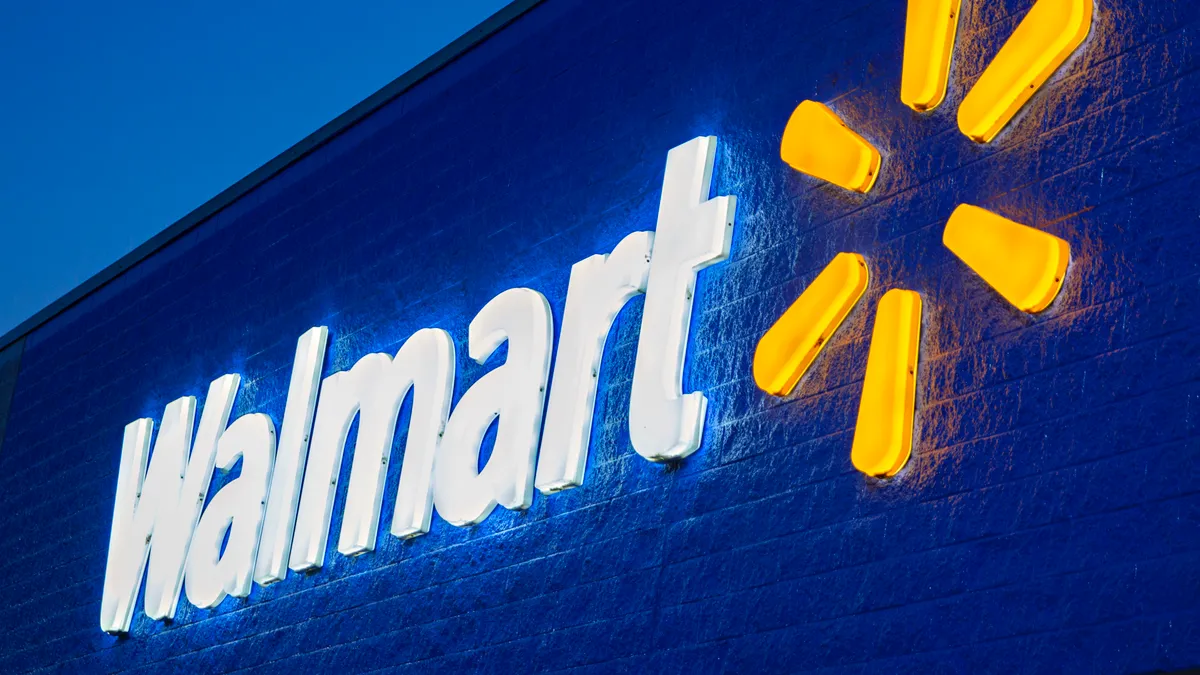Dive Brief:
-
Walmart is creating a fintech startup in partnership with venture capital firm Ribbit Capital, the big-box retailer announced Monday.
-
The new venture will "develop and offer modern, innovative and affordable financial solutions" to customers and employees, Walmart said.
- "For years, millions of customers have put their trust in Walmart to not only save them money when they shop with us but help them manage their financial needs," John Furner, president and CEO of Walmart U.S. said in a statement.
Dive Insight:
The details of Walmart's new fintech startup are scarce. The Bentonville, Arkansas-based company did not disclose the name of the new entity, specific services or a launch date.
The retailer said the strategic partnership "will bring together Walmart's retail knowledge and scale with Ribbit's fintech expertise to deliver tech-driven financial experiences tailored to Walmart's customers and associates."
The startup will be majority-owned by Walmart and its board will include Furner, Walmart Executive Vice President and CFO Brett Biggs and Meyer Malka, managing partner of Palo Alto, California-based Ribbit Capital.
Walmart said its plans to add independent industry experts to the fintech's board and build a management team of experienced fintech leaders. The company also plans to grow the startup through partnerships and acquisitions with fintech companies.
"When we combine our deep knowledge of technology-driven financial businesses and our ability to move with speed with Walmart's mission and reach, we can create and deliver financial offerings that are second to none," Malka said in a statement.
Walmart's intention to expand into fintech is not the first time the retail giant has made moves into the financial services space.
In partnership with Green Dot, the company already operates a prepaid debit card called Money Card, which customers can load with funds and use to make purchases.
Walmart said it will continue to serve customers through its existing financial services products, including Money Card, check cashing, money transfers, installment financing and its Walmart credit card.
Andrew Cosgrove, the former general counsel and chief compliance officer at LendingUSA, said he thinks Walmart's new fintech plans could mean the retail giant is looking to bring its financial services infrastructure in-house.
"Green Dot owns all of the interface, the technology and the whole infrastructure," he said, regarding Money Card. "I think they feel like it would be more useful for them to build their own infrastructure, which is what most fintechs are doing."
Ribbit Capital's past investments in top-tier fintechs such as Affirm, Credit Karma and Robinhood also signal the retailer is setting itself up for a successful venture, said Cosgrove, whose former company, the challenger bank Upgrade, is also a Ribbit portfolio company.
"Ribbit Capital is a top-tier fintech investment venture capitalist," he said. "Malka is really well-versed in all areas of fintech. I believe that they're going to be well positioned to create a winning product, whatever the product might be."
Walmart's brick-and-mortar presence could also help the retailer win over the unbanked and underbanked, a demographic that has historically had trouble trusting financial institutions, including online-only fintechs, Cosgrove said.
"The fact that Walmart has bricks-and-mortar locations in many communities will go a long way in building that trust," he said.
Commerce and banking
Walmart has acted on its financial services ambitions in the past when it unsuccessfully pursued a banking license via the controversial industrial loan company (ILC) charter route in 2005.
Walmart's bank charter application was met with industrywide opposition, and the company withdrew it two years later.
Large corporations moving into finance have drawn criticism from lawmakers and bank trade groups in recent months, as fintech firms and commercial companies have shown increasing interest in obtaining ILC charters.
Japanese e-commerce giant Rakuten has been pursuing an ILC since the summer of 2019.
"We have a very large customer base already in the United States, and part of our aspirations is to provide banking services to them," Rakuten Bank America CEO Lee Carter told Banking Dive in August.
Sen. John Kennedy, R-LA, warned against commercial firms obtaining bank charters when he introduced a bill at the end of 2019 aimed at closing a "loophole" that allows ILCs to bypass oversight by the Federal Reserve.
"If they're allowed to handle your banking services, they're going to turn into continents," he said at the time.














